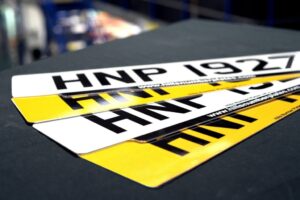Motor industry would save at least 2,000 tonnes of unrecyclable plastic every year by switching to aluminium number plates.
Hills Numberplates calculates that at least 2,000 tonnes of plastic are needlessly created every year by OEMs and car dealerships opting for plastic number plates.

The study – which analyses all 2021 new and used car sales* – highlights the environmental damage that traditional plate materials, such as acrylic, can cause. Plastic plates are often difficult — or, in some cases, impossible — to recycle, meaning millions of them end up in landfills every year.
These findings coincide with growing concerns about how many carbon emissions the automotive industry produces every year, with many automakers under pressure to reduce their environmental impact.
Commenting on the topic, Rob Laugharne, Managing Director at Hills Numberplates, said: “Tackling tailpipe emissions is becoming easier with the adoption of new technologies, but the carbon impact of car materials remains a challenge for many in the industry.
“That’s why it’s important that car manufacturers and dealers look closely at the parts and materials they use and make sustainable choices. We may not think a number plate could contribute to a car’s carbon impact, but these figures show that it all adds up.”
Hills Numberplates has innovated aluminium plates which are sustainable and have unlimited recycling capabilities — MetaTek and the newly launched EcoTek. Developed and manufactured in the UK, these number plates are stronger, lighter and more durable — all while reducing the carbon impact of the car.
Rob adds: “Our aluminium number plates were created in response to the growing environmental pressures of the industry, and we’re proud to say that MetaTek and EcoTek are the most sustainable number plates in the UK.
“With the capability to reduce plastic waste by at least 2,000 tonnes every year, opting for aluminium plates on new and used cars can contribute to a cleaner, greener world.”
*Assumptions are based on average approximation of 500g of acrylic plates per car (standard oblong less weight, lipped and square more)- 2000 cars = 1 tonne of plates. Figures are based on New Reg all vehicles from Vehicle Licensing Statistics 2021and 2021 Used Car Transactions SMMT.
Have you seen our recent piece in Fleetcar, featuring comments from Managing Director Rob Laugharne: https://shorturl.at/lryDW
Hills Social Media
LinkedIn – @Hills Numberplates Ltd
Twitter – @HillsPlates
Youtube – @HillsNumberplates
Happy to help
For more information or help with placing an order, you can contact our friendly Customer Service Team on 0121 623 8050, option 1 or email salesadmin@hillsnumberplates.com.
Archives
- January 2024
- September 2023
- July 2023
- June 2023
- May 2023
- June 2022
- February 2022
- December 2021
- November 2021
- October 2021
- February 2020
- March 2018
- February 2018
- September 2017
- December 2016
- August 2016
- February 2016
- October 2015
- May 2015
- November 2014
- August 2014
- April 2014
- November 2013
- July 2013
- February 2013
- September 2012
